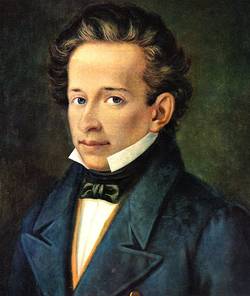Reviewed by Alta Macadam

Il Giovane favoloso, a film released in Italy this autumn, describes the life of the country’s greatest Romantic poet (in fact its greatest poet, together with Dante and Petrarch). This undertaking, by director Mario Martone, was highly ambitious: Elio Germano as Leopardi re-enacts the life of this great literary figure and philosopher, born in the Marche in east Italy in 1798 and who died at just 38. Germano succeeds superbly in the role, reciting the some of Leopardi’s most famous poems, and letters to his close friend and mentor Pietro Giordani. The film was given its première at the Venice Film Festival in September and was also shown at the London Film Festival in October (hopefully it will soon be on general release in the UK and US). The locations include the poet’s home town of Recanati, as well as Florence, Rome and Naples (where he died during a cholera outbreak), and will be greatly appreciated by all who love Italy. The music, by Sascha Ring, is very beautiful.
The Zibaldone, Leopardi’s notebook and diary full of philosophical observations, which was first published many decades after his death, has now been published in an English edition (Penguin Classics, 2013, eds Michael Caesar and Franco D’Intino). It is the first complete translation into English of this fundamental work.
Despite his fame, Leopardi is difficult to define: fluent in Greek, Latin and Hebrew, he was a Classical scholar as well as a philosopher and in many ways anticipated 20th-century thinking, being critical of the belief in progress and close to existential theories. In some ways he can be compared to Wordsworth, although the English poet is much more joyful in spirit. Leopardi was intensely religious as a boy though his views grew more unorthodox and critical as the years went by: interestingly, the only disparaging review in the Italian press so far has been in the Vatican newspaper, the Osservatore Romano (25th October).
The film takes almost all its dialogue straight from original documents or letters, and Elio Germano’s capacity to immerse himself totally in the role has been much remarked on. In Recanati the film was shot in Leopardi’s family home, where the actor also lived for many months, even learning to write with a quill pen. The Neapolitan director has worked much in theatre (and in fact he recently staged Leopardi’s Operette morali, an allegorical dialogue) and this is evident throughout the film. It was daring to decide to let Germano recite some of the poems as if he was composing them, but these passages of the film are some of the most moving. Very little artistic licence has been taken, although the scene in the brothel in Naples is invented and is perhaps one of the few disappointing moments in the narrative. All in all the film is an honest reconstruction of Leopardi’s life which avoids clichés and shows up his more lively side and underlines his quick ironic humour, managing to get away from the label of ‘pessimist’ which is all too often attached to him and which has perhaps tended to limit appreciation of his deep character.
This is the first time that Leopardi’s poetry has been recited on the big screen and the film ends in a villa on the slopes of Vesuvius during an eruption, while Leopardi composes his last poem, La Ginestra.
The supporting roles are very well played, from his close friend Ranieri (Michele Riondino), who represents the poet’s fragile attachment to the real world, to Leopardi’s father Monaldo (Massimo Popolizio, until now mainly known as a stage actor), whose human side is successfully portrayed alongside his determined ambition to bring up his children imbued with literature. He would have approved, perhaps, of the fact that classes of Italian schoolchildren are being taken to see this film.
Where to find Leopardi in the Blue Guides:
Leopardi’s home town of Recanati is covered in detail in Ellen Grady’s Blue Guide The Marche & San Marino, the new, fully-revised 2nd edition of which is fresh off the press. His former home is now a museum and much of the early part of the film was shot in and around it. The ball game known as pallone al bracciale, re-enacted in the film with Leopardi as a spectator, is described in the same Blue Guide (and also in Blue Guide Central Italy). The poet’s relationship to the English colony in Pisa, where he stayed for a year in 1827, is recorded in Alta Macadam’s Blue Guide Tuscany, available in print and digital. You will find Leopardi’s grave site in Naples in Paul Blanchard’s Blue Guide Southern Italy, also available in print and digital.







I am doing some intensive Italian in Lucca and my teacher, Elena, is a great fan of Leopardi so she also told me about this film and we have been working together on some of his poems. I knew nothing about him until I went to Recanati three years ago ( thanks Ellen for the Blue Guide account!) and came across him. A vastly interesting poet and philosopher.
What a smashing review! Thank you Alta, for having taken the time to record your impressions of this beautiful film, and in so doing, putting Leopardi finally into context for Anglo-Saxon poetry lovers – for whom, perhaps, he is rather a shadowy figure at best. Further appreciation of the poet’s work will arrive after reading the Zibaldone, and by visiting his fascinating home town, the golden, intricately maze-like Recanati.